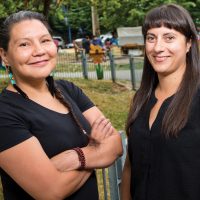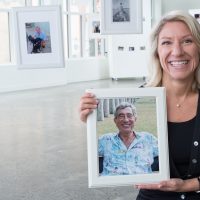Any cancer is scary, but lung cancer is a particularly insidious disease – 70% of all lung cancers are diagnosed in advanced stages. Lung cancer is the most common and deadliest form of cancers with a five-year survival rate of less than 18%. An average of six British Columbians die each day from lung cancer making prevention and early detection the key to saving more lives.
That was the inspiration behind a $1.2 million gift from philanthropists Emily and Jason Ko. Their transformational gift supports a Lung Cancer Screening Pilot Program at Vancouver General Hospital (VGH), conducted by Dr. Stephen Lam, an award-winning scientist specializing in early detection of lung cancer, Dr. John Yee, Head of Thoracic Surgery and Dr. John Mayo, Head of Radiology. The pilot program pioneers a new model for lung cancer screening using a risk-based approach and computer aided diagnostics. Initial results from the donor-funded study laid the groundwork for a first in BC-wide lung cancer screening program by 2022.

CT scanners can help diagnose lung cancer at an earlier stage, notes Dr. John Yee, Head of Thoracic Surgery, VGH
For Jason, a well-known business leader from Taiwan, this issue hits close to home. His wife, Emily, was a thoracic surgery Head Nurse and has seen first-hand the devastating effects of lung cancer, particularly in patients who had never smoked. This was one of the reasons why Jason and his family felt so compelled to act. “Lung cancer has affected many of my friends who are non-smokers and this was our way of helping save lives so that others can receive care earlier,” says Jason, who was inspired by the spirit of giving from his late mother. As successful immigrants, the Kos believe that their legacy is in sharing their wealth with the community and giving back to help others, a philosophy that they share with their family and employees at their company Viva Pharmaceutical.
“Lung cancer has affected many of my friends who are non-smokers and this was our way of helping save lives so that others can receive care earlier.” – Jason and Emily Ko
The pilot screening program’s goal is to enroll 2,000 high-risk individuals over a three-year period with a two-year follow-up. The study is international in scope and examines the value of inclusion of air pollution exposures for risk assessment. It also applies advanced computer technology with the goal of improving efficiency and accuracy of reading large number of screening CT scans, as well as decreasing unnecessary imaging studies or biopsies. These tools will help allow medical professionals at VGH and BC Cancer Agency to successfully implement the new province-wide initiative.
Like other cancers, early detection can mean the difference between a treatable disease or palliative care. “We know that low-dose CT scans help diagnose lung cancer at an earlier stage and can reduce lung cancer mortality by up to 20%,” says Dr. John Yee, Head of Thoracic Surgery at VGH and Director of the BC Lung Transplant Program. “There’s no question that our ability to detect lung cancer earlier will have a tremendous impact on people’s health.”
With more than 1.6 million people worldwide dying each year from lung cancer, the impact of the Ko family’s generosity in funding this important screening program is transforming health care globally.

